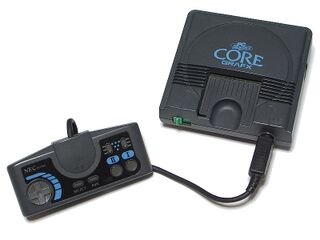Difference between revisions of "PC Engine CoreGrafx"
From NEC Retro
| (8 intermediate revisions by 4 users not shown) | |||
| Line 1: | Line 1: | ||
{{ConsoleBob | {{ConsoleBob | ||
| − | | | + | | logo=CoreGrafx logo.png |
| consoleimage=CoreGrafx set.jpg | | consoleimage=CoreGrafx set.jpg | ||
| − | |||
| name= | | name= | ||
| − | | maker=[[NEC]] | + | | maker=[[NEC Home Electronics]] |
| releases={{releasesPCE | | releases={{releasesPCE | ||
| pce_date_jp=1989-12-08 | | pce_date_jp=1989-12-08 | ||
| + | | pce_code_jp=PI-TG3 | ||
| pce_rrp_jp=24,800 | | pce_rrp_jp=24,800 | ||
| pce_date_fr=1990 | | pce_date_fr=1990 | ||
| Line 13: | Line 13: | ||
{{stub}}The '''PC Engine CoreGrafx''' (PCエンジンコアグラフィックス) is an update to the [[PC Engine]] console, initially released in Japan in late 1989. | {{stub}}The '''PC Engine CoreGrafx''' (PCエンジンコアグラフィックス) is an update to the [[PC Engine]] console, initially released in Japan in late 1989. | ||
| − | The CoreGrafx was announced around the same period as the [[PC Engine SuperGrafx]], adopting a similar colour scheme, but otherwise being largely identical to a regular PC Engine. The CoreGrafx replaces the PC Engine's RF output with a composite A/V connector, but remains the same size and shape to allow it to interface with the [[CD-ROM²]] and other attachments which require the PC Engine's rear expansion port. The shell is not identical to the console's first iteration, but aside from aesthetics, the changes are negligible. | + | The CoreGrafx was announced around the same period as the [[PC Engine SuperGrafx]], adopting a similar colour scheme, but otherwise being largely identical to a regular PC Engine. The CoreGrafx replaces the PC Engine's RF output with a composite A/V connector, but remains the same size and shape to allow it to interface with the [[CD-ROM²]] and other attachments which require the PC Engine's rear expansion port. The shell is not identical to the console's first iteration, but aside from aesthetics, the changes are negligible. The CoreGrafx uses the same revised HuC6280A CPU as was used in the SuperGrafx. This revision reportedly fixed some minor audio issues in those systems. |
The console also shipped with a [[PI-PD06]] controller - a CoreGrafx flavoured version of the [[PI-PD002]], replacing the standard [[PI-PD001]] controllers of the original PC Engine. | The console also shipped with a [[PI-PD06]] controller - a CoreGrafx flavoured version of the [[PI-PD002]], replacing the standard [[PI-PD001]] controllers of the original PC Engine. | ||
| Line 27: | Line 27: | ||
| square=yes | | square=yes | ||
}} | }} | ||
| − | + | ==References== | |
| + | <references/> | ||
| + | |||
{{PCEngine}} | {{PCEngine}} | ||
Latest revision as of 16:53, 6 April 2024

| |||||||||||||||

| |||||||||||||||
| PC Engine CoreGrafx | |||||||||||||||
|---|---|---|---|---|---|---|---|---|---|---|---|---|---|---|---|
| Manufacturer: NEC Home Electronics | |||||||||||||||
|
This short article is in need of work. You can help NEC Retro by adding to it.
The PC Engine CoreGrafx (PCエンジンコアグラフィックス) is an update to the PC Engine console, initially released in Japan in late 1989.
The CoreGrafx was announced around the same period as the PC Engine SuperGrafx, adopting a similar colour scheme, but otherwise being largely identical to a regular PC Engine. The CoreGrafx replaces the PC Engine's RF output with a composite A/V connector, but remains the same size and shape to allow it to interface with the CD-ROM² and other attachments which require the PC Engine's rear expansion port. The shell is not identical to the console's first iteration, but aside from aesthetics, the changes are negligible. The CoreGrafx uses the same revised HuC6280A CPU as was used in the SuperGrafx. This revision reportedly fixed some minor audio issues in those systems.
The console also shipped with a PI-PD06 controller - a CoreGrafx flavoured version of the PI-PD002, replacing the standard PI-PD001 controllers of the original PC Engine.
The CoreGrafx became the de facto model of PC Engine until the release of the CoreGrafx II in June 1991.
Physical scans
References
| PC Engine |
|---|
| PC Engine (1987) | CoreGrafx (1989) | CoreGrafx II (1991) X1 Twin (1987) | PC-KD863G (1988) | Shuttle (1989) | GT (1990) | LT (1991) |
| Add-Ons |
| AV Booster (1988) | Interface Unit (1988) | Ten no Koe 2 (1989) | Backup Booster (1989) | Backup Booster II (1989) | Ten no Koe Bank (1991) | Memory Base 128 (1993) |
